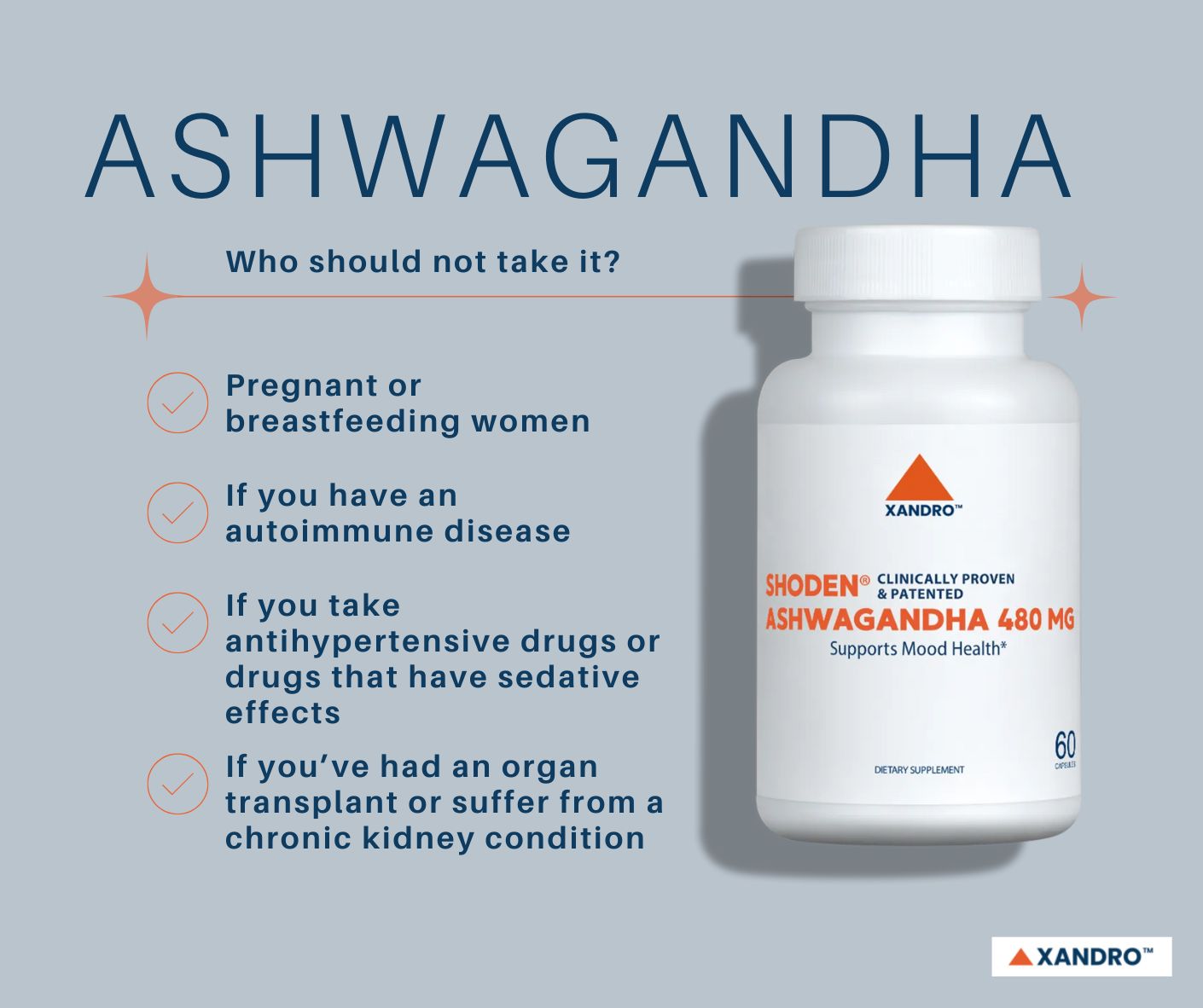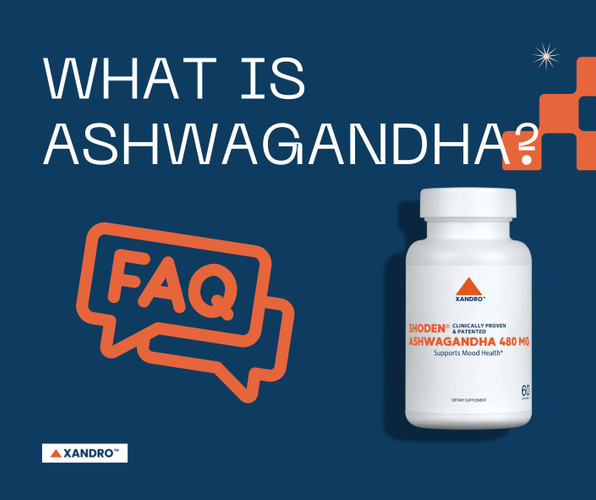FAQs About Ashwagandha | Xandro Lab
10th May 2024
What is Ashwagandha?
The ashwagandha plant has been used in traditional medicine for thousands of years. This is because it has a range of adaptogenic — substances that help the body adapt to stress — and cognitive benefits, and many around the world now incorporate it into their daily routine.
Before you do so, it’s important to have your questions answered so you’re well informed about what you’re putting into your body — not just with ashwagandha, make sure to do the same with any new supplement and speak to your doctor before you start taking it.
What is ashwagandha good for?
Ashwagandha works by helping reduce cortisol and the production of other stress hormones, as well as by improving the function of our adrenal glands.
Here are some specific ashwagandha benefits on our bodies:
- It has calming and relaxation properties.
- It supports healthy stress response and helps the body adapt to stress.
- It supports brain health, such as improving attention span, executive function and working memory.
- Helps with inflammation in joints and muscles, as well as skin inflammation
- May improve our immune function.
- Improves sleep quality, as well as reducing the time it takes to fall asleep.
- Improves blood sugar levels and glycaemic control, possibly helping diabetics.
- Helps with weight loss by increasing leptin, the appetite suppression hormone, reducing stress and improving sleep.
- May improve longevity and increase lifespan.
- May improve heart health by enhancing cardiorespiratory endurance.
- May improve athletic performance by increasing strength, muscle mass and endurance, as well as reduce fatigue and improve recovery time after exercise.
- Ashwagandha benefits for females and ashwagandha benefits for men include helping to maintain healthy hormone balances and supporting healthy sexual function.
What is Shoden® ashwangandha vs KSM-66?
There are currently three main forms of ashwagandha, Shoden®, KSM-66 and Sensoril®. They each are made differently and contain different percentages of the key compound that helps with stress, called withanolide glycosides.
Shoden® ashwagandha contains the highest at 35 per cent, while Sensoril® contains 10 per cent and KSM-66, 5 per cent. Shoden® ashwagandha has the highest bioavailability due to the amount of withanolides within, with these being found in the blood even after 24 hours. The reason you hear about KSM-66 ashwagandha commonly is because it’s been around the longest and is used in the majority of clinical trials made on ashwagandha. The number of trials using Shoden® ashwagandha, the youngest formulation, is on the rise, though.
Further Reading: The Different Forms of Ashwagandha
Is ashwagandha safe?
Ashwagandha should be safe to take for up to three months, but it’s best to have breaks after this to give your body a break, before starting up again. Large doses of ashwagandha may cause diarrhoea, vomiting or an upset stomach. In rare cases, high doses of ashwagandha may cause liver failure. Generally, though, ashwagandha is a safe herb to take. To be sure, speak with your doctor before taking ashwagandha, especially since it can interact with certain medications. Also, don’t take ashwagandha if pregnant as it may cause miscarriages or premature birth, and don’t take if breastfeeding.
Is ashwagandha ok to take daily?
If you work in an office, ashwagandha can even help improve focus, productivity and decision-making abilities as it may reduce your stress and anxiety levels. These adaptogenic benefits can also help at home, improving your mood and energy levels.
If you’re an athlete, ashwagandha may even improve your athletic performance by increasing your strength, muscle mass and endurance, as well as help reduce fatigue and improve your recovery time after exercise.
Ashwagandha can take days if not weeks for you to fully feel its benefits, so you should take it consistently and daily to build up your levels.
Further Reading: Longevity Benefits of Ashwagandha
What is ashwagandha side effects?
Taking large amounts of ashwagandha may cause indigestion, diarrhoea, nausea and vomiting, with rare cases of allergic reaction and liver failure possibly occurring.
Who should not take ashwagandha?
Don’t take ashwagandha if pregnant or breastfeeding, as it may cause some distress to the baby and cause premature labour. Due to its effect on the immune system, it may cause the immune system to become more active, so speak with your medical professional before taking ashwagandha if you have autoimmune diseases like lupus and rheumatoid arthritis. If you take antihypertensive drugs, their effects may be amplified when taking ashwagandha, as might the sedative effects of certain drugs.
Always make sure to speak with your doctor before taking any new supplement.

Is ashwagandha a drug?
No, ashwagandha is a herb, known as an adaptogenic, known for its ability to help regulate stress and anxiety. It’s been used as part of traditional medicine and Ayurveda for thousands of years. You can use ashwagandha leaves to make tea, take it as a serum or take capsules.
Can ashwagandha cause weight gain?
No, in fact, it may actually help with weight loss. As mentioned above, it enhances the appetite suppression hormone, called leptin, helping to curb our appetite, but it also indirectly benefits weight loss by reducing stress and improving our sleep, two factors helping with weight management.
Can ashwagandha cause anxiety?
Ashwagandha is known for its calming properties, helping reduce stress and anxiety, as mentioned above. Despite this, your body chemistry may interact with ashwagandha differently and may potentially trigger anxiety. This may happen if you’re mixing ashwagandha with certain medications and supplements, so speak with your medical professional before taking ashwagandha and start a supplement journal to test your body’s reaction to different supplements.
Further Reading:Tips for Tracking Supplements
Does ashwagandha make you sleepy?
Ashwagandha can help with sleep, including sleep duration, quality sleep and the time it takes to fall asleep. One study found that those who took 600mg of ashwagandha root for 12 weeks had significantly improved sleep quality and mental alertness compared to those who didn’t. Due to its effect on anxiety and its calming properties, ashwagandha is great for those who want to improve their sleep, especially those with insomnia.
What is the ashwagandha dosage for sleep?
Shoden® ashwagandha dosage for sleep is about 120mg of a root and leaf extract per day, compared to between 250 and 600mg per day of KSM-66 root extract.
For benefits other than sleep, take between 250 and 500mg per day for immune health and reduced inflammation, 300mg for memory, 750 and 1250mg for muscle growth and strength, 600mg to reduce stress and anxiety and between 250mg and 3g to reduce blood sugar levels. In general, take between 250 to 500mg of ashwagandha per day.
Does ashwagandha really increase testosterone?
Ashwagandha testosterone benefits come from it altering our sex hormones and reproductive hormones. It’s been found to increase testosterone and SHEA in overweight men, helping balance their hormones and help them lose weight.
Why is ashwagandha not FDA approved?
Since ashwagandha is a herbal supplement, the FDA doesn’t approve it since they don’t approve any herbal products or supplements. The industry is unregulated, so make sure you purchase supplements form reputable manufacturers that have third-party testing, like Xandro Lab.
Is ashwagandha ok for kidneys?
Herbal supplements are not for everyone, especially for those with organ transplants and those with kidney issues. This is the case with ashwagandha as high doses may cause kidney failure and require a kidney transplant, with the transplant possibly being rejected form the body, so if you suffer from a chronic kidney condition or failure, don’t take ashwagandha.
How to take ashwagandha capsules?
This will depend on the manufacturer’s instructions, but for Xandro Lab’s Shoden® Ashwagandha, take two capsules a day, preferably with food to reduce the chances of an upset stomach, one at lunch and one at dinner. Start with a lower dose and then gradually increase as your body gets used to it.
How to take ashwagandha powder?
Follow the manufacturer’s directions for how to use it. You can use ashwagandha powder to make a tea or hot drink, adding the required dosage amount to hot milk or water with a splash of vanilla. You can even add ashwagandha to a smoothie, where you can add higher amounts, or even add it to fruit juices.
As for ashwagandha dosage timing, there is no specific time of day to take ashwagandha, so when you take it depends on what you’re using it for, but if taking it for sleep, take it either after lunch or just after dinner. For stress, you can take it in the morning to experience the benefits throughout the day.
Further Reading:Time of Day to Take Ashwagandha
Is ashwagandha Halal?
This will depend on the manufacturer, so if a supplement doesn’t tell you on the packaging or on the brand’s website, be sure to get in contact with the company. Some manufactures use an alcohol extraction process to isolate ashwagandha’s bioactive compounds, while others include the addition of additives, such as gelatin, which comes from pork, fillers, binders and preservatives that may be prohibited. While Xandro Lab products are Halal-friendly and do not contain any animal products, at the moment, Xandro Lab’s Shoden® Ashwagandha is not Halal-certified.

Can ashwagandha cause hair loss?
Hair loss can be caused by stress and anxiety, so ashwagandha can actually improve your hair loss situation by reducing these stressors on your body. Ashwagandha can also help address hormonal imbalances, such as those associated with thyroid issues, helping reduce thyroid hair loss. A study even found that ashwagandha can help enhance hair density, growth and thickness.
The thing is, since ashwagandha can fix hormone imbalances, it can also increase testosterone, which can increase Free T and DHT levels, which can cause hair loss. This is the case with many supplements people take for working out or bulking up. Many people don’t experience the hair loss side effects of ashwagandha especially since it also helps the body in many ways, so when you start taking ashwagandha, monitor its effects on your body through a supplement journal, and if you notice it affecting your hair, stop taking it.
Further Reading:Manual for Starting Supplements
Can ashwagandha cause acne?
In some cases, you might find that ashwagandha can cause acne. This is the case with many herbal supplements, as they affect your hormones. Ashwagandha can lower your cholesterol and increase your testosterone, which may cause acne, so start slow until your body gets used to the herb, then gradually build up your dosage. You might want to avoid ashwagandha if you have acne-prone skin. Keep in mind that, in moderation, ashwagandha can also have skin benefits as it balances your hormones.
Does ashwagandha make you emotionless?
Ashwagandha has calming and anxiety-reducing effects due to its adaptogen benefits. In this way, it can have a mild calming and emotion-regulating effect, but it’s rare for people to experience emotional bluntness when taking ashwagandha, especially when taking it properly.
There is one study that people have cited online that mentions a permanent suppression of adrenal function after long-term ashwagandha treatment, which may suppress emotions, but this study was conducted on one woman with a low BMI and who suffered from chronic pain and lethargy. While the results are cause for further studies to be made, there are currently no large-scale clinical human studies that specifically report a blunting of emotions when taking ashwagandha.
As stated, it’s important to take any herbal supplement properly. Ashwagandha is thought to be safe when taken for three months, so after this time frame, take a break before slowly introducing it again.
Where can I buy Ashwagandha?
You can find ashwagandha supplements at some grocery stores, health stores, dedicated supplement stores and online. If you’re after ashwagandha Singapore, check out Xandro Lab’s Shoden® Ashwagandha!
End Note
As mentioned, ashwagandha isn’t some new and un-tested supplement. There are hundreds of studies surrounding the herb and it has proven benefits. Make sure to speak with your medical professional before taking it to make sure it's right for you, but if you’re looking for the best ashwagandha supplement, why not give Xandro Lab’s Shoden® Ashwagandha a try?
Read more about the scientifically-backed trials surrounding ashwagandha here!
